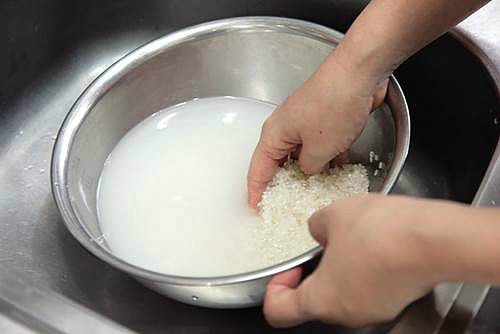3 things to note when washing rice and cooking it that cannot be ignored
Washing rice too thoroughly removes nutrients from the outer layer of the rice grain such as fiber, vitamins, iron, zinc... which are beneficial for the body.
A wrong habit when cooking rice of many families is to wash rice thoroughly and use cold water to cook. According to Associate Professor, Dr. Nguyen Thi Tram, Institute of Crop Research and Development, rice provides carbohydrates, vitamins and minerals, supplementing energy for the body. In particular, mainly B vitamins (B1, B3, B6) and fiber. In addition, rice also contains vitamin E, iron, zinc, and even omega 3.
These nutrients are most abundant in the outer layer of the rice grain. Therefore, if you wash the rice too thoroughly and squeeze out all the cloudy water, you will lose the important nutrients of the rice grain. Along with that, the bran layer around the rice grain contains a lot of cellulose, which helps promote the excretion of cholesterol, reducing the amount of harmful cholesterol in the blood.
|
70-95% of B vitamins are lost during the milling and washing of rice. Photo:China |
Many people like to eat rice cooked from beautiful white rice without knowing that the more refined the rice is processed, the less cellulose it contains. Then the rice is difficult to create a feeling of fullness, causing the amount of food taken into the body to increase, making it easy to get obesity.
White rice is cooked from rice grains that have had the bran layer removed, then polished to prevent mold. That means the best nutrition of the rice grains is lost. Absorbing too much starch from white rice can lead to diabetes, edema, high blood pressure...
According to Associate Professor Tram, another mistake when cooking rice is cooking with cold water. When using cold water, the rice grains swell, the nutrients expand and dissolve into the water.
Using boiling water to cook, the rice grains will be sticky, the outer layer of the rice grains will contract to create a protective film, the grains will not crack or break, and the amount of vitamin B1 retained is 30% more than when cooked with cold water.
“You should not throw away the rice water because it will lose a large amount of nutrients again,” said the associate professor.
Note when washing rice to cook:
- Do not mill the rice too white. When washing the rice, do not rub it too hard. Just wash the rice, stir gently, and drain the water to remove worms and sand.
- You should use boiling water to cook rice instead of using cold water.
- When the rice boils, turn down the heat and cover to keep it warm. Avoid contact with air because this is a factor that further destroys the vitamins in the rice.



